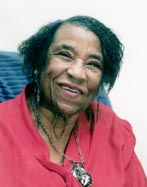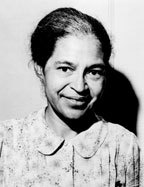
 |
||
 EIRNS/Stuart Lewis |
The Beauty
|
 Library of Congress |
The Beauty of Rosa Parks
| Amelia Boynton Robinson composed a commemortaion to “The Beauty of Rosa Parks” on the First anniversary of Mrs. Park’s death on October 24, 2005. Mrs. Robinson, vice-chairwoman of the Schiller Institute, and whose fast friendship with Mrs. Parks spanned well over half a century, delivered the following at a memorial service held in Washington, D.C., on October 24. |
October 24, 2006
What a beautiful memory. The memory of a woman, though frail, awoke the people throughout America from their complacency, three or more generations ago, in Montgomery, Alabama.A little more than a half century ago, history was made when my friend Rosa Parks sat on the bus in Montgomery, and refused to give up her seat to a white man who was standing on a crowded bus. She refused to give up her rights as an American citizen, and rather than become a coward and get up, she turned her fear into faith. Rosa knew by disobeying the racists’ demand, she could have been beaten, or killed, and the law would call it justifiable homicide, because it was said Blacks had no rights. Her faith became so strong as her fear faded, and within her mind she was determined to stand by her principle, even if it meant she would die. Her only hope was that people of color would have that same determination until they became free. She sat, so we could stand.
Mrs. Rosa Parks was a firm believer in God and depended upon His guidance throughout her life. As a guiding angel, she was supplied by God within a never-ending friend, Elaine Steele, who for forty years or more, had been her constant companion, her confidante, her eyes when she could not see, ears when she could not hear, and voice when she could not talk. She carried Rosa’s plans and ideas to a successful business.
Though frail in size, meek in manner, and fearless in her challenges, she felt protected by God and angels.
If Rosa Parks, with her strong faith, firmly standing by her belief, had obeyed the racists’ demand, there might not have been a bus boycott in Montgomery. John Lewis might not have become Congressman. Andrew Young might not have become U.S. Ambassador or Mayor of a major Southern city — Atlanta, Georgia. If Mrs. Parks had been weak enough to give up her seat on the bus, there might not have been a Bloody Sunday in Selma, Alabama, where, in the midst of a bloodbath on the highway, hundreds of people were beaten as they marched for their freedom. Nor might there have been a Bruce Carver Boynton, whose case Boynton v. Virginia outlawed racial segregation in interstate travel, if Rosa Parks had not sat on the bus, and refused to give up her seat so a White man could sit down. She was forced off and slammed into jail.
Had she not done what she did, there might not have been a Martin Luther King, who shook up the entire world, lighting that little spark of conscience, turning hate into love, and violence into non-violence, and he might have ended as a great minister in a popular church.
She faced adversities, and through it all, Rosa Parks gained strength and courage, and, like an electrical conductor, she was able to galvanize people of color, who then followed in her footsteps, thus bringing forth the civil rights, human rights, and change of heart in human beings. Rosa left a legacy for all men, women, and children: to love even the hater, and to live non-violently.
If Rosa Parks could speak to you today, she would say, as in the poem of William Cullen Bryant:
So live, that when thy summons comes to join
The innumerable caravan, which moves
To that mysterious realm, where each shall take
His chamber in the silent halls of death,
Thou go not like the quarry-slave at night,
Scourged to his dungeon, but, sustained and soothed
By an unfaltering trust, approach thy grave,
Like one who wraps the drapery of his couch
About him, and lies down to pleasant dreams.
![]()
schiller@schillerinstitute.org
The Schiller Institute
PO BOX 20244
Washington, DC 20041-0244
703-297-8368
Thank you for supporting the Schiller Institute. Your membership and contributions enable us to publish FIDELIO Magazine, and to sponsor concerts, conferences, and other activities which represent critical interventions into the policy making and cultural life of the nation and the world.
Contributions and memberships are not tax-deductible.
VISIT THESE OTHER PAGES:
Home | Search | About | Fidelio | Economy | Strategy | The LaRouche Frameup | Conferences
Links | LaRouche | Music | Join | Books | Concerts | Highlights | Education |
Health | Spanish Pages | Poetry | Dialogue of Cultures
Maps | What's New
© Copyright Schiller Institute, Inc. 2006. All Rights Reserved.